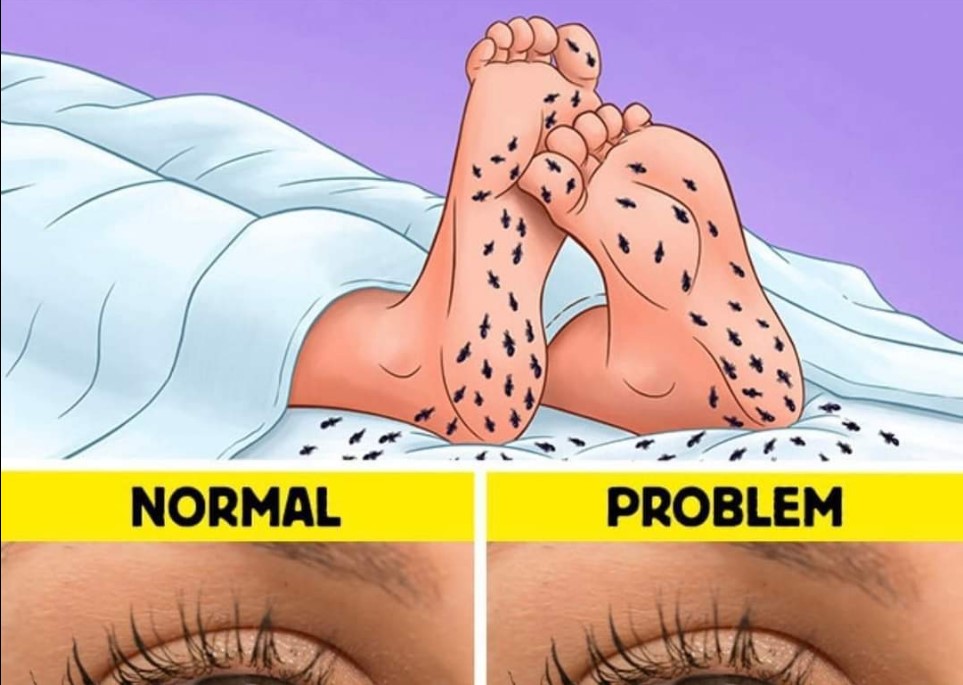HT6. 10 Ways Your Body May Be Telling You Something’s Wrong
Your body is constantly sending you signals. If you pay attention to it, it will tell you when something isn’t quite right. Some of these signals are very obvious, like a stuffy nose when you have a cold, or a fever when you have the flu or an infection, but other signs of poor health are not so obvious.
Some, however, are much more subtle. Sometimes, signs of a chronic health issue are less apparent. While these issues are usually not as dangerous as acute health problems, if they’re not addressed they could lead to something more serious. For this reason, paying attention to them is important.
There is an almost infinite number of subtle ways your body could be trying to tell you something. While this list is by no means exhaustive or meant to diagnose, the following are ten signs of poor health, and what to do about them.
10 Subtle Signs of Poor Health
Occasionally you may notice small changes in your body. Perhaps it’s in your skin, or you’re craving a certain food. In many cases, it probably means nothing. Sometimes, however, it could mean you’re lacking a certain nutrient, or it could be an early sign of a more serious health problem.
1. A Crawling or Achy Feeling in Your Legs

If you experience a crawling sensation in your legs, or you have an uncontrollable urge to move, you may be experiencing restless leg syndrome (RLS) and is a big sign of poor health. It often occurs in the evening or night time when you’re sitting or lying down.
RLS is also known as Willis-Ekborn disease. The main symptom is the urge to move the legs, and most people experience some relief when they stretch, jiggle their legs, pace, or walk. Some of the sensations you might experience with RLS are:
- Crawling
- Creeping
- Pulling
- Throbbing
- Aching
- Itching
- Electric
Since it typically occurs at nighttime, RLS can interfere with your sleep. This, in turn, can affect your quality of life. Many people with RLS never talk to their doctor because they’re afraid they won’t be taken seriously. There are some ways, however, that a doctor can help people with RLS.
There are some medications that a doctor can prescribe to you, such as those that increase dopamine to the brain, or drugs that affect calcium channels. Certain opioids, muscle relaxants, and sleep medications may also help.
There are also some home remedies that can help treat RLS. A warm bath or a massage can help relieve symptoms, as can using hot or cold packs to lessen limb sensations. Some also find relief using supplemental magnesium. Fatigue tends to make RLS worse, so establishing a good sleep routine to make sure you’re getting adequate rest can also help.
Getting moderate, regular exercise can also help relieve symptoms, but overdoing it or working out late in the evening can make them worse. Sometimes cutting back on caffeine consumption can also help.
There is also a special foot wrap designed for people with RLS that can improve the condition. Talk to your doctor about getting one for yourself [1].
2. Your Skin is Getting Thicker

Skin problems can often be ignored. Your skin, however, is the largest organ in your body and can tell you a lot about your health. Skin that becomes thick and itchy could be a sign that there is something going on internally. The following medical conditions could cause your skin to thicken:
- Pityriasis rubra pilaris (PRP): this is a chronic, inflammatory skin condition [2,3].
- Psoriasis: a chronic skin condition in which your body makes new skin cells faster than old skin cells are cast off [2,4].
- Hypothyroidism: A common disorder that occurs when your thyroid gland does not produce enough thyroid hormone [2,5].
If you notice raised patches of skin that are thick, red, or itchy, you should talk to your doctor. They can perform blood tests to get to the root of the problem. Once they know the cause, they can determine an appropriate treatment plan.
3. Your Handwriting, Your Sense of Smell, or Your Dreams Change

Although it may sound bizarre, these could all be early symptoms of Parkinson’s disease. Symptoms of the disease usually occur gradually and get worse over time. They may include:
- Tremor (trembling) in hands, arms, legs, jaw, or head
- Stiffness of the limbs and trunk
- Slowness of movement
- Impaired balance and coordination, sometimes leading to falls
- Depression or other emotional changes
- Difficulty swallowing, chewing, and speaking
- Urinary problems or constipation
- Skin problems
- Sleep disruptions
Early signs of Parkinson’s are often very subtle. For example, you might have very slight tremors or have difficulty getting out of a chair. You might notice your handwriting is slow or looks cramped and small. You may even find you’re often speaking too softly.
Many people with the disease report that before they started experiencing tremors or stiffness, they had sleep problems, constipation, they couldn’t smell very well, and they had restless legs.
There is no cure for Parkinson’s, but there are some treatment options to relieve symptoms. Of course, the earlier you can get a diagnosis, the more effective treatment will be.
If you think you may have the disease, talk to your doctor. Many other diseases have similar features but require different treatments, so it is important to determine your exact diagnosis [6].
4. You’re Experiencing Anger and Aggression

Of course, anger is a normal emotion that we all experience from time to time. Excessive, uncontrolled anger that is triggered by trivial issues, however, is not. What many people may not realize is that sudden outbursts of anger can actually be a sign of depression.
There have been multiple psychologists and clinicians who have suggested that difficulties coping with anger could play an important role in depression and anxiety disorders. Many of them have noted that a propensity toward hatred and hostility is a sign of depression.
Many treatment options for depression, however, ignore anger as a symptom. If you or a loved one are struggling with angry outbursts, consider talking to your doctor or a mental health professional for help [7].
5. You’re Sleeping Too Much

It is healthy to sleep seven to nine hours every night. If you find you’re sleeping far longer than that, or you’re having trouble staying awake during the day, it could be a sign of a larger issue.
Hypersomnia is when you have recurrent episodes of excessive daytime sleepiness or prolonged nighttime sleep. This is not the same as being tired from a lack of sleep. Individuals with hypersomnia feel the need to nap throughout the day, often at inappropriate times. These naps, however, don’t ever provide relief from symptoms.
Hypersomnia could be a sign of certain medical conditions, including multiple sclerosis, depression, encephalitis, or epilepsy. Treatment may include a prescription for a stimulant drug, or behaviour changes. This could mean avoiding night shift work or staying out late, changing your diet, or avoiding caffeine and alcohol [8].
6. Your Eye Color Changes

If you notice a grey ring appear around the cornea of your eyes, it could mean that you have arcus senilis. It is not typically cause for concern, however in some cases it could lead to health complications if there is a hidden cause and it is left untreated.
The main cause of arcus senilis is aging. It is when fat deposits form in the outer part of the cornea. It could be a sign that you have high cholesterol, although this is not always the case. If you are found to have high cholesterol, a doctor can prescribe a mixture of medications and lifestyle changes to help get your cholesterol down to healthy levels [9].
7. You’re Craving Salt

Salt cravings are quite common, and can often be tied to boredom or stress. When your craving becomes almost uncontrollable, however, it could be a sign of an underlying medical condition.
Excessive salt cravings could be a sign of the following health problems:
- Addison’s Disease: occurs when the adrenal glands do not make enough hormones.
- Bartter Syndrome: a genetic condition that presents at birth. People with this syndrome cannot reabsorb sodium in their kidneys, causing them to lose sodium, potassium, and calcium in their urine.
- Cystic Fibrosis: a hereditary disease that affects the lungs and digestive system.
These conditions usually present themselves with other symptoms as well, so if you’re experiencing uncontrollable salt cravings, talk to your doctor. They can help you identify any other symptoms and determine a cause [10].
8. You’re Forgetful, Tired, and Have a Desire For Intimacy

While these can be symptoms of a variety of health conditions, such as depression, it could also signify a thyroid problem. When your thyroid makes too little hormone, this is called hypothyroidism.
Hypothyroidism can make you feel tired, gain weight, or make you unable to tolerate cold temperatures.
Thyroid disease is often the result of another disease that affects how the thyroid gland works. For this reason, it is important to talk to your doctor, particularly if you’re experiencing a few of the following symptoms:
- Feeling tired (fatigue).
- Gaining weight.
- Experiencing forgetfulness.
- Frequent and heavy menstrual periods.
- Having dry and coarse hair.
- Having a hoarse voice.
- Experiencing an intolerance to cold temperatures.
These signs of poor health may be subtle, so your doctor will help you determine if your thyroid is causing your symptoms. They will then be able to figure out why your thyroid is acting that way and develop an appropriate treatment plan [11].
9. You’re Always Thirsty

Polydipsia is the medical term for extreme thirst that you cannot quench by drinking. It is not in itself a disease, but a symptom of other health problems. Along with being unable to quench your thirst, Polydipsia will also cause you to have dry mouth.
Polyuria, or excessive urination, may also accompany polydipsia. Causes of polydipsia may include:
- high blood sugar levels due to diabetes mellitus
- diabetic ketoacidosis (DKA), a complication of hyperglycemia due to diabetes mellitus
- low vasopressin levels as a result of diabetes insipidus, a rare condition
- dehydration
- a loss of bodily fluids, for example, through sweating, diarrhea, or vomiting
- the use of certain medications
Polydipsia is a common symptom of high blood sugar levels. If you’re experiencing dry mouth and excessive thirst, but have not been diagnosed with diabetes, you should talk with your doctor.
If you have diabetes and you are experiencing these symptoms, you should check your blood sugar levels. Be aware of your symptoms, if they do not go away, you should talk to your doctor, since your treatment plan may need adjusting [12].
10. You Want to Chew Ice

The constant desire to crunch on ice is known as pagophagia. It’s a common, but a subtle sign of poor health, but rarely reported, form of pica. Research has shown that an iron deficiency or another type of anemia could be the cause.
If you are experiencing pagophagia, a quick blood test will reveal if anemia is the cause. If that is the case, you may need to take a supplement to reverse the deficiency [13].
Listen to your Body
Your body will often send you subtle signals when something is off. It is important not to ignore these symptoms, because if you can catch a health problem in its beginning stages, it’s generally easier to treat it.
You know your body best, and if something feels off, you owe it to yourself to look into why. It could be nothing, but if not it is in your best interest to take care of the problem before it gets worse. Keep these subtle signs of poor health in mind.













